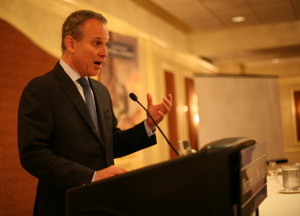Speaking Monday at a regional housing summit in New Windsor, state Attorney General Eric T. Schneiderman announced he will allocate an additional $40 million from New York”™s share of a national mortgage settlement to extend for two years his office”™s Homeownership Protection Program for distressed borrowers facing the loss of their homes.
The program, a statewide network of 89 housing counseling and legal services providers, assisted nearly 34,000 New York homeowners in its first two years of operation, according to Schneiderman”™s office in a report released during the Democratic attorney general”™s appearance at the annual housing summit of Hudson Valley Pattern for Progress. The program provides counselors and lawyers to help delinquent or defaulted borrowers through the loan modification or foreclosure process with mortgage lenders and the courts.

The Center for New York City Neighborhoods and the Empire Justice Center, two organizations anchoring the HOPP network, reported 5,049 households in the Hudson Valley, including Westchester, sought assistance through the program, which funded approximately $3.6 million in housing and legal services in the region. New York City in the last two years received the largest share of HOPP funding, approximately $13.8 million, for 12,556 households seeking assistance.
Three Hudson Valley communities were among the hardest hit by the mortgage crisis in New York, according to the attorney general”™s report. Based on 2014 data from the Urban Institute, Newburgh had 1,314 borrowers who were more than 90 days delinquent on their mortgages, or 16 percent of the total number of mortgages in the area. Middletown this year had 1,300 distressed loans, or 19 percent of total mortgages in that Orange County community. In Rockland County, Spring Valley had 907 homeowners in distress this year, or 16 percent of outstanding mortgages there.
Schneiderman created the three-year HOPP program in 2012, allocating up to $60 million from the state”™s $130 million share of the national mortgage settlement that year with the five largest mortgage servicers. The attorney general told his New Windsor audience that New York families have received about $2 billion in mortgage modification benefits from the settlement, far more than the $600 million in mortgage relief that the federal Department of Housing and Urban Development had estimated New York homeowners would receive.
The attorney general”™s office in the report said almost one-third of HOPP clients are in active negotiations for or have received loan modifications.
“By every measure, the HOPP program has been a tremendous success,” Schneiderman said. But the program must be extended while the effects of the mortgage crisis continue in New York, he said. As of last December, more than 225,000 mortgage loans in the state either were in foreclosure or delinquent for more than 90 days ”“ about 10 percent of all mortgages in New York. “Extending this program is critical because the foreclosure statistics are so great,” he said.
For distressed homeowners who do not qualify for mortgage modifications, Schneiderman this year started the New York State Mortgage Assistance Program, or NYS MAP, which will provide non-interest-bearing loans of up to $40,000 to help families pay mortgage arrears, overdue property taxes and other debts that are obstacles to mortgage modifications and keeping their homes.
The NYS Map program will begin accepting applications this fall.



















